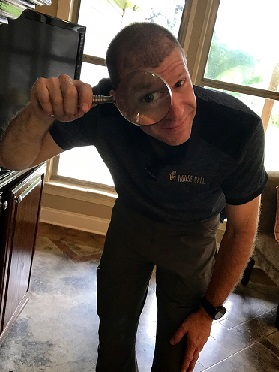I am a Professional Home Inspector, which is a pretty cool job. I get to help people for a living. So, I do my best to make sure that my clients’ needs are met. This typically involves answering questions about the house they’re considering buying, as well as the occasional question about the home-buying process. While inspectors typically answer the same questions over and over, there is one question that none of us want to hear from our clients. And without a doubt, it is the question that we’re asked most frequently by our clients: “Should I buy this house?”

Sometimes the buyers question us covertly, approaching their inspector in a different part of the house, away from their real estate agent. Some of them will call us after the inspection is over, looking for some “off the record” advice. And some of them will simply ask in front of their agent, looking for their inspector to guide them in this all important home buying decision.
But we’ve got to be on the look out for this situation. Answering this question can put is in a tricky position, can easily set us down a slippery slope if the wrong thing comes out our mouth. It’s important that we know that this question is coming, and have a proper response already planned for these clients.
Diplomacy is the art of knowing what not to say.
Matthew Trump
Obviously, our first responsibility is to the rules and laws of our individual state and/or professional organization. We should know exactly what our responsibilities are and be prepared for what we’ll say in this situation. A recommendation for or against the purchase of a home we’ve inspected can easily be construed as an opinion on the value of the house, and that is not in a home inspector’s job description.
We’re not there to advise home buyers regarding the purchase of a home. We are there to inspect the house, document any potential concerns or problems, and relay that information to our clients in a clear and concise manner. That is the extent of our job duties, and we should adhere to our standards and stay in our lane.
Everything else to do with the sale of that home is somebody else’s responsibility. Home inspector, real estate agent, appraiser, termite inspector, lender, insurance agent, title company; they all have specific jobs to do in a real estate transaction.
Venturing into any part of the transaction that is not within our area of expertise is a recipe for disaster.
Inspecting houses is pretty repetitive, and so is dealing with our clients. We’re likely to get the same questions (in some form or fashion) from all our clients. Just like every other item we should be ready for while doing our job, we should be prepared for the dreaded question. We should anticipate that it’s coming, and should have some type of well-rehearsed answer at the ready.
Obviously, every home inspection is different and every client is unique. We must always remember to play to our audience, taking into consideration the distinct circumstances of every situation. But having pre-practiced “scripts” for each of these common situations is a sure way to increase our efficiency and lessen our stress.
When faced with this situation, I usually offer the same advice to my clients: Typically, anything that’s wrong with a house can be fixed. The important question is always whether or not it makes financial sense to do so.
As we’re often faced with a situation where we barely even know our clients, we’re certainly not in any position to advise them on their home purchase. Fortunately, they already have someone who fits that bill: their Realtor. In conjunction with their appraiser and lender, the buyers hire their Realtor to advise them regarding their home buying decision.
An professional home inspectors, we should step back and let them do their job so we can concentrate on ours.
Knowing how to stay in our own lane while doing our job is one of the most difficult things we must learn as an inspector. Most of us pride ourselves on the fact that we’re helping our clients with the largest financial decision of their lives. It can be difficult to reign in our desire to help. It’s ingrained in our DNA. But we’ve got to realize where those boundaries are, and we’ve got to be able to adhere to them.
So, when we find ourselves in this situation, we’ve got to think long and hard about what it is we’re going to say. Spitting out the wrong answer could have long-term, negative implications on our career.
Or, we could just repeat the same old, worn-out speech that’s worked every time before.
I welcome all feedback (both positive and negative) on this post.
Please take a moment to leave a comment below. Thank you
Want to be an Influencer in Your Field? Share This Post!
Thanks, Joe



